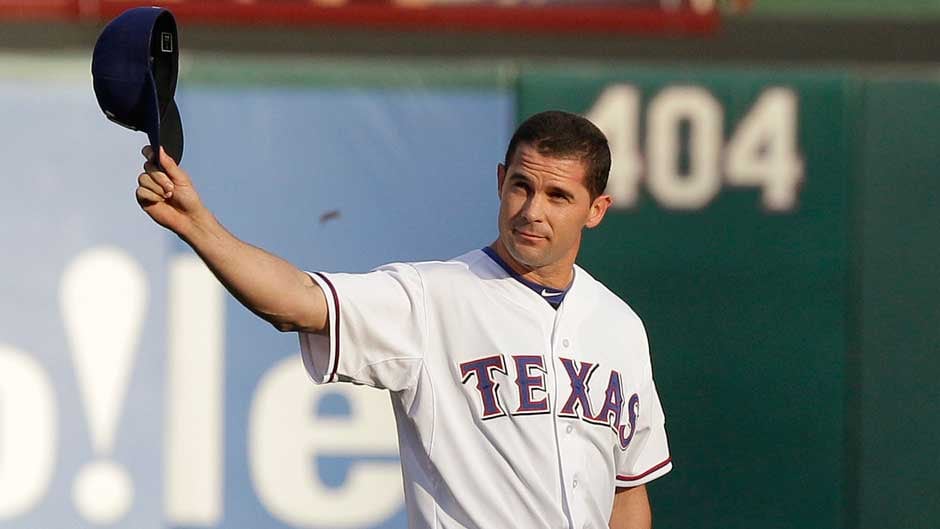
Major Report: Rangers Another Top Veteran Retires After Decades-Long MLB Career, Following Final Chapter With Texas Rangers
Rangers Lose Another Veteran to Retirement After Long MLB Career
In the world of Major League Baseball, few things remind us of the passage of time more than seeing longtime players hang up their cleats. The Texas Rangers, a franchise that has seen its share of legends, are again the endpoint for a veteran’s final chapter. This time, the player in question is **Nick Ahmed**, a two-time Gold Glove shortstop, whose decision to retire marks the end of a long and productive career. ([Reuters][1])
### The Final Swing: Nick Ahmed’s Farewell
Nick Ahmed officially announced his retirement in July 2025, at the age of 35. ([Reuters][1]) His decision comes on the heels of a modest final season in which he appeared in five games with the Rangers. ([Reuters][1]) Though his time in Texas was brief, it closed out what had been a 15-season MLB journey. ([Reuters][1])
Ahmed was originally drafted by the Atlanta Braves in 2011, then spent a decade with the Arizona Diamondbacks, where he earned Gold Glove honors in 2018 and 2019. ([Houston Chronicle][2]) Over his career, he played in 964 major league games, compiled 72 home runs and 339 RBIs, and maintained a .233 batting average. ([Reuters][1])
In his announcement, Ahmed expressed gratitude to the teams that supported him:
> “To all of the organizations I got to play for… Atlanta, thank you for drafting me! … and TEX … thank you for giving me chances to continue doing what I loved!” ([Reuters][1])
More Than a Number: What Ahmed’s Career Meant
While Ahmed’s time in Texas was short, his overall career reflects traits that many teams value: resilience, defensive prowess, and professionalism.
* His Gold Glove awards underscore his reputation as a dependable defender — especially during his Arizona years. ([Houston Chronicle][2])
* Over the years, he often filled utility, depth, and veteran roles — showing that MLB careers aren’t always defined by star power, but also by steady contribution.
* His brief stint with the Rangers was symbolic: a veteran completing his career with a club he joined late, but that became part of his story.
In this way, Ahmed joins a small tradition of veteran players concluding their careers with the Rangers, whether by design or circumstance.
### A Broader Context: Retirements in the Rangers Orbit
Ahmed’s retirement isn’t happening in isolation. The Rangers and MLB at large are in a transition phase where long-serving players are moving on.
* **Kevin Pillar**, a journeyman outfielder, officially announced his retirement in July 2025 after 13 MLB seasons. ([ESPN][3]) He spent a brief stretch with Texas in 2025 before being released, and used a podcast platform (Foul Territory) to make his farewell public. ([ESPN][3])
* Earlier retirements, like those of **Elvis Andrus** (who retired officially as a Ranger) ([Reuters][4]) and **Ian Kennedy** (who retired not long after winning a ring with Texas) ([Wikipedia][5]), show a trend of veterans closing their careers in or around the Rangers’ domain.

For the Rangers, each departure is a reminder of the need to cultivate new talent, both in the field and in the clubhouse. Veterans bring leadership, continuity, and mentorship—qualities that are often harder to replace than raw statistics.
### Looking Ahead: What’s Next for the Rangers?
With more veteran exits, the Rangers face several challenges and opportunities:
1. **Leadership voids**: As seasoned players leave, younger players must step into roles as mentors and clubhouse influences.
2. **Roster flexibility**: Departures create roster and payroll space, allowing for new signings, prospects, or strategic upgrades.
3. **Honoring legacies**: The franchise often seeks ways to acknowledge its veterans—retiring numbers, hall of fame inductions, or ceremonial appearances.
For Nick Ahmed, though his time in Texas was short, he now becomes part of that legacy. His farewell is a moment for reflection—not only on his journey from draft pick to Gold Glove winner, but also on how teams evolve with the comings and goings of players.
Leave a Reply